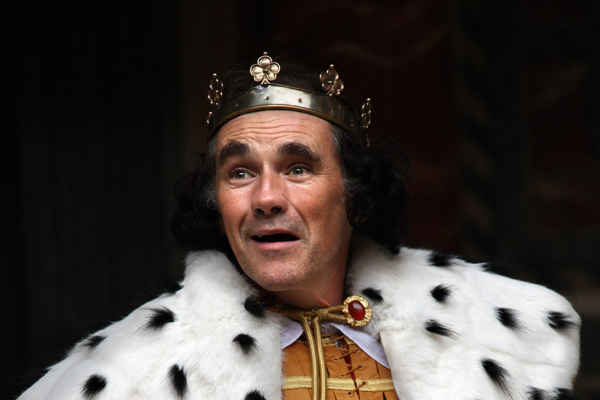Richard III is seriously bad for your health. Any actor will tell you that the part of the ‘bunch-backed toad’ is so physically punishing that the chap in the title role usually ends up being injected with painkillers by the local quack before each show. Or he finds himself in hospital when he should be on stage.
Mark Rylance has heeded these warnings. His Richard — an astonishing feat of creative originality — is very nearly able-bodied. He has no crutches, no twisted limbs, no bandy legs, no hump weighing him down like a medicine ball. He walks with a faint limp. He carries a withered arm discreetly under his doublet. And he has a slight suggestion of a cyst-ette on his shoulder. Otherwise, he’s perfectly formed. Rylance will probably make it to the end of the run without becoming addicted to Class-A drugs.
From the moment he appears, he toys with our expectations. He’s dandyishly dressed in a velvet cape, a golden tunic, a debonair cap and a pair of sumptuous amber stockings. But his manner is distracted, low-key, out of rhythm. He stutters his lines. He chuckles to himself. He frowns and squints and scratches his balding scalp. It’s a Stan Laurel performance. There’s even a hint of the stray mongrel in there too. No one has ever played Richard like this. It’s true he gives us the Evil Laugh, just as we expected, but he lays it on early and only once. And by overdoing it, massively and deliberately, he makes it clear that we need to drop all our preconceptions about the character. Thus warned, we watch transfixed as something fresh, something unheard of, something uniquely horrible comes into being.
Gone is the scheming political superman who delights in outsmarting his opponents. Instead Rylance offers us something simpler, dumber, nastier, but much truer: a compelling portrait of a psychopath. A human being fully possessed by the viper spirit of the jungle. Here is a man who potters around various royal palaces striking down his enemies almost for want of something better to do. The point is that Richard is destructive only by accident. Fate has placed him in a society where his power and his malice can range freely because he’s surrounded by trust, goodwill and frailty. Hitler was in a similar position.
Tim Carroll’s stylish, self-confident production moves along at a good clip. As always with the Globe, there are lots of laughs in lots of unexpected places. But not too many either. The well-drilled cast have been told to refrain from over-milking the fun. Not everything is perfect though. Roger Lloyd-Pack (best known as Trigger from Only Fools and Horses) plays Buckingham with the same lugubrious, off-beat mannerisms as Rylance. And it works brilliantly. They’re like a couple of monstrous twins who seem committed, almost telepathically, to an identical gameplan of murder and rapacity. However, the rest of the cast are tossing out their lines in traditional ‘hack-taw’ mode and their grand manner cuts against Richard and Buckingham’s understated double act.
And something else is a little out of kilter. Tim Carroll has decided to give us a lesson in Shakespearian realism by having the ladies and princesses of the court played by adult males. (Memo to Tim: they were played by angelic boys of choir-school age in Shakespeare’s time.) The result is absurd. Strapping six-footers are dolled up in white slap and glossy red lipstick. Their stiff wigs peep out from beneath tightly drawn wimples. And they have great artificial bustles strapped to the undercarriages of their swishing skirts. These pantomime costumes force each actor to mince up and down the stage like Danny La Rue inspecting the Royal Welch Fusiliers. And they squeak out their lines in falsetto Monty Python voices as well.
I couldn’t make head or tail of it. To place such deliberate stylisation alongside its diametric opposite, Mark Rylance’s beautifully calibrated naturalism, is to inflict much avoidable damage on the production.
Rylance’s best-known stage role is Rooster Byron from Jez Butterworth’s Jerusalem. And those fans hoping to see an even richer and more fascinating human portrait are likely to be disappointed. Rylance never finds as much variety and colour in Richard as he did in Butterworth’s philandering gypsy. And his Richard doesn’t develop as it might. There’s a flatness here, a monochrome flavour, a deadness even. My guess is that Rylance regards this play as a bracing and necessary lesson in the origins of evil. He shows us that wickedness is nearer than we want to believe. It’s next door. And perhaps even closer than that. And in the end, he can’t quite hide the loathing he feels for the spirit he has created.







Comments